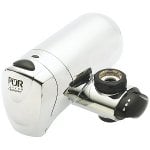We recently heard from 'Brad' who emailed, "Looking to test for THMs."
Thank you, Brad, for the inquiry. At this point we know of no at-home water test kit exists that test for THM's (trihalomethanes) or other DBP's (disinfection byproducts). Testing for those sorts of substances/compounds requires laboratory techniques and equipment.
With that said, companies like National Testing Laboratories offer mail-in water testing services that include tests for THM's. The most basic one we know of is called "Watercheck City-Check Basic" and you can read more about it in the Water Test Kit Store.
Results of testing carried out by National Testing Laboratories typically get emailed to customers about 10 business days after the lab receives samples for analysis.
What are THM's?
The term trihalomethanes describes a class of compounds in the disinfection byproduct family which get created when a disinfectant (example: chlorine in the form of hypochlorous acid) interacts with and/or neutralizes organic contaminants in water.
Scientists and health officials have determined that consuming water with elevated levels of THM's poses a threat to human health and therefore the EPA regulates the amount of THM's that public water supplies may possess. If a water system's internal testing reveals higher than allowed levels of THM's the water system must immediately remedy the situation and in most cases must also report the failed tests to its customers within a specified period of time.
Filtering THM's Out of Drinking Water
Can home water filters remove or drastically reduce THM's in drinking water? Yes, some do have that ability. As an example, several of the home water filters in the Multipure product line have been tested according to NSF/ANSI Standard 53 for the reduction of a number of potentially harmful drinking water contaminants including THM's.
During that testing Multipure’s Drinking Water Systems' Aquaversa, Aquaperform and Aquadome water filter systems effectively reduced concentrations of unwanted contaminants to less than or equal to the permissible contaminant limits for filtered water leaving the systems.
If you'd like to see the full list of potential drinking water contaminants Multipure filters remove or reduce, you can view that information here.






